Android - 2.1
Extension ID
com.castsoftware.android
What’s new?
See Android 2.1 - Release Notes.
Description
This extension provides support for Android technologies. This extension works together with the com.castsoftware.jee and the com.castsoftware.kotlin extension. If your JEE or Kotlin application source code uses Android technologies you should install this extension.
Features
AndroidManifest file
This file will be analyzed to understand whether the application is indeed an Android application. Some objects (exposed service/activity/receiver) are created under the manifest to represent exposed services. Then links are created from these services to the methods which are listeners of these services.
Android Event handling support from XML file
- onClickListener()
- onLongClickListener()
- onFocusChangeListener()
- onKeyListener()
- onTouchListener()
- onCreateContextMenu()
Android Event handling support from setEventListenner and addEventListener in widgets
- The lambda function can be used to define the event handler. Sample: Button.setOnClickListenner(new View.OncLickListentHandler{…}), with lamda function: Button.setOnClickListenner( (v) → {})
Android Type XML support
- Widget Layout
- AndroidManifest file
WebServices support
Support for third-party WebServices is provided:
- httpClient library with namespace cz.msebera.android.httpclient.
- httpClient library with namespace org.apache.http.client.HttpClient.
- httpUrlConnection from java.net.URL and java.net.HttpURLConnection.
- Create webservice via AsyncTask class of Android.
- Transaction between client and server on fullstack project.
- Transaction between event handler widget and http method call.
End to End transactions
- End to End transactions are resolved:
- Entry point: layout ui xml file, exposed services
- End point: web service, persisting data, intent resource calls
Supported Android versions
| Version | Supported |
|---|---|
| 4.4 - 10.0 |
Technology support
| Technology | Supported |
|---|---|
| Java | |
| Kotlin |
Supported libraries
androidx.room for kotlin
import androidx.room.Entity
@Entity(tableName = "contact", primaryKeys = ["contactId", "contactUuid"])
data class Contact(
var contactId: String = "",
var contactUuid: String = "",
var displayName: String = "",
var pictureUri: String? = null,
var contactInfo: List<ContactAddressBook> = listOf()
) : Parcelable
import androidx.room.*
@Dao
abstract class ContactDao {
@Query("SELECT * FROM contact")
abstract fun getAll(): LiveData<List<Contact>>
@Update
abstract fun updateContact(contact: Contact)
@Insert(onConflict = OnConflictStrategy.REPLACE)
abstract fun insertAll(contact: List<Contact>): List<Long>
}
android.app.Application and com.ad4screen.sdk.A4SApplication for java and kotlin
“onCreate” and “onApplicationCreate” methods are now called from the android application object.
Function Point, Quality and Sizing support
| Function Points (transactions) |
A green tick indicates that OMG Function Point counting and Transaction Risk Index are supported. | |
|---|---|---|
| Quality and Sizing | A green tick indicates that CAST can measure size and that a minimum set of Quality Rules exist. |
CAST Imaging Core compatibility
| Release | Operating System | Supported |
|---|---|---|
| 8.3.x | Microsoft Windows |
Dependencies with other extensions
Some CAST extensions require the presence of other CAST extensions in order to function correctly. The Android extension requires that the following other CAST extensions are also installed:
- com.castsoftware.jee
- com.castsoftware.kotlin
- com.castsoftware.internal.platform (internal extension) ≥ 0.8.0
- com.castsoftware.wbslinker (internal technical extension) ≥ 1.6.1 funcrel
Download and installation instructions
The extension will be automatically installed by CAST Imaging Console.
Source code discovery
The Android extension does not contain any discoverers or extractors, therefore, no “Android” specific projects will be detected. Your Android source code should be part of a larger Java/JEE related project which you are also analyzing, and as such, JEE Analysis Units and/or Kotlin Analysis Units will be created automatically - simply ensure that the path to your Android source code is included in these JEE/Kotlin Analysis Units:
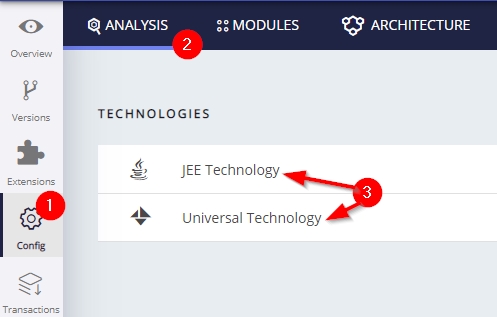
What results can you expect?
Android application
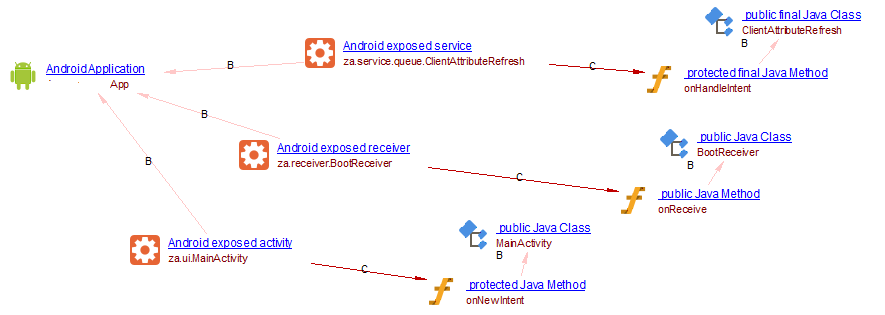
Transactions
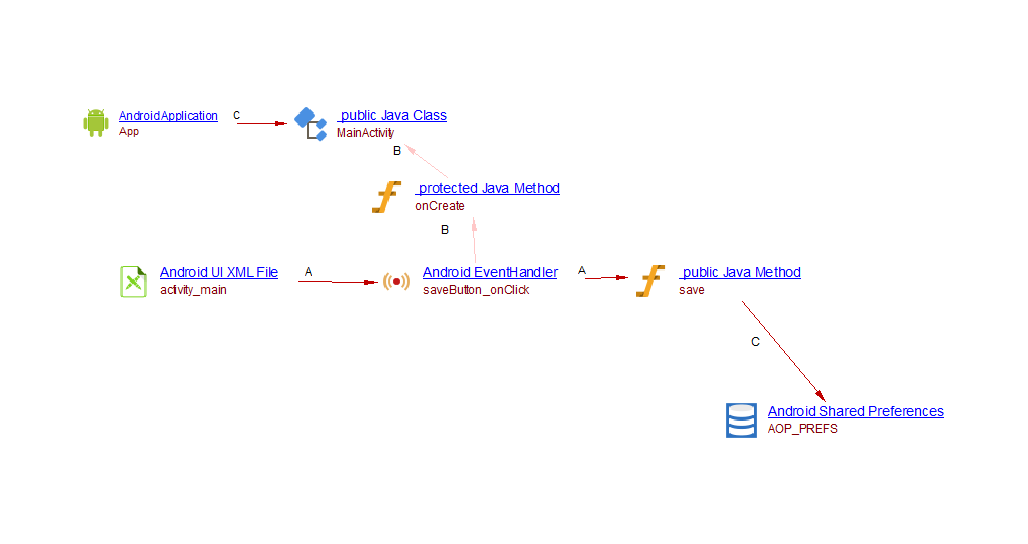
Web services linker
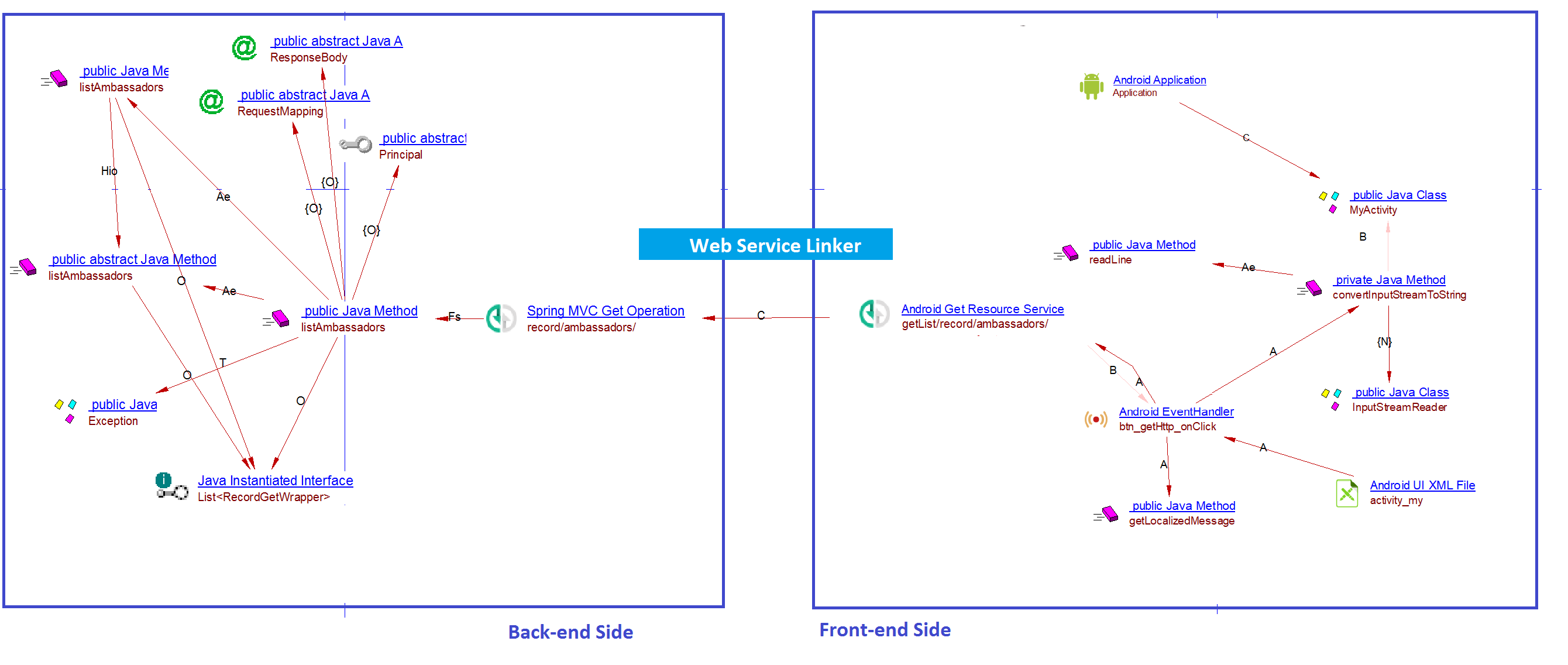
Function points
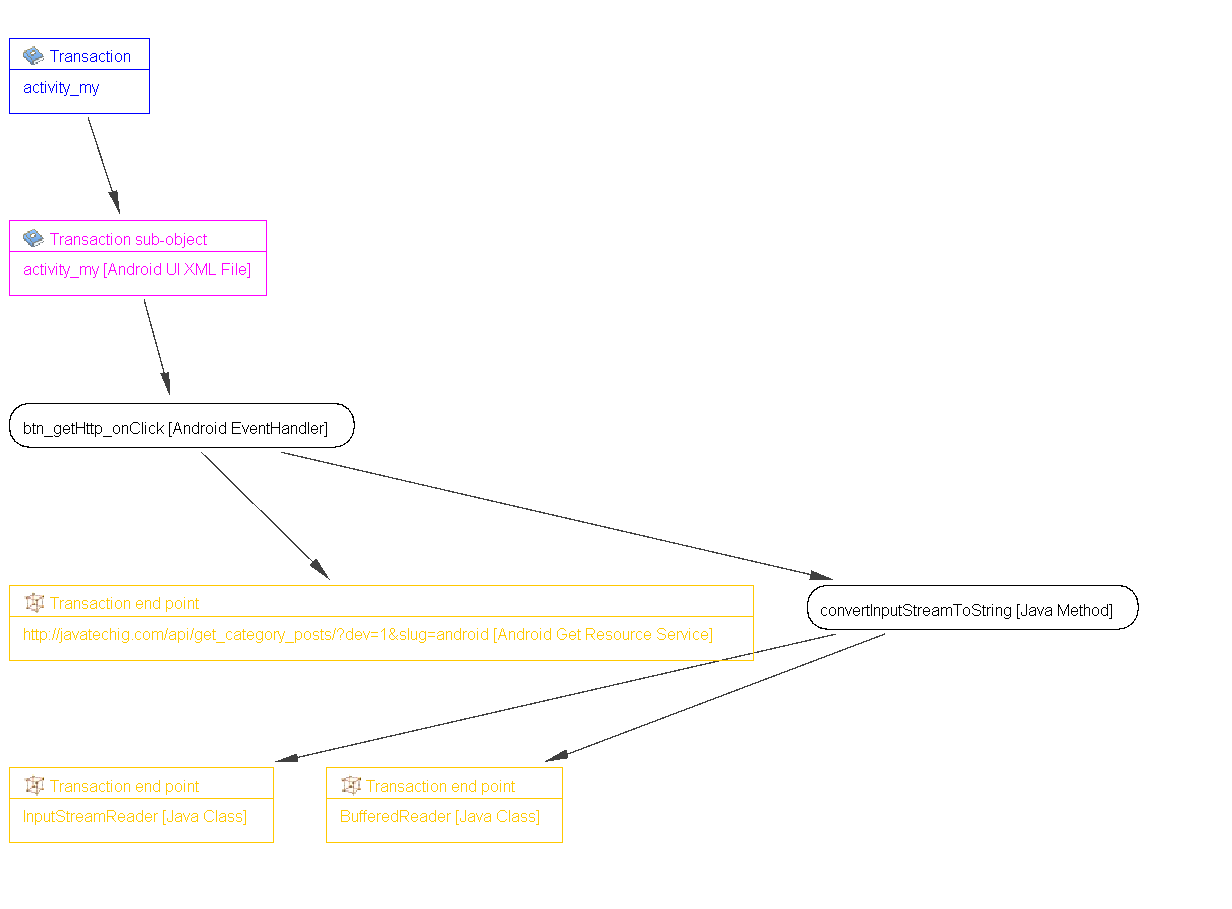
Objects
| Icon | Description |
|---|---|
|
Android EditText, Android TextView |
|
Android Button, CheckBox, Item |
|
Android EventHandler |
|
Android Get Resource Service |
|
Android Put Resource Service |
|
Android Post Resource Service |
|
Android Delete Resource Service |
|
Android Shared preferences, Android internal storage, Android external storage |
|
Android Application |
|
Android UI XML File |
|
Android exposed service, Android exposed activity |
|
Android exposed receiver |
|
Android intent resource |
|
Android room entity |
|
Android GridView, Android Group, Android Layout, Android LinearLayout, Android ListView, Android Menu, Android RelativeLayout, Android Spinner, Android TimePicker, Android Undefined Widget, Android WebView. |
Structural Rules
The following structural rules are provided:
Known limitations
- CAST recommends using the most recent stable release of CAST Imaging Core with the extension for best results.
- Some links won’t be resolved because of missing jar file.
- There are some limitations for transactions with Lamda Expressions.
- Web Service URI name isn’t stable for more complex situations.




